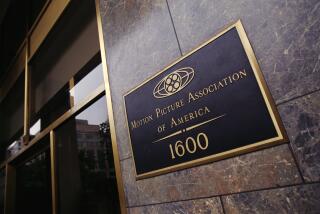MPAA Is the One That’s Dazed and Confused
This time the Motion Picture Assn. of America has gone too far. It first incurred my wrath by its maddening use of the NC-17 label--an “X” in sheep’s clothing--to punish erotic films, while allowing violent ones to squeak by with an R rating. (Philip Kaufman’s “Henry & June” received the NC-17, for example, while “Terminator 2” was released with the far more tolerable R.) It angered me that the MPAA ratings board consistently deemed mass genocide more acceptable for our nation’s children than making love.
The board next raised my ire by batting its collective eyelashes and innocently claiming the system to be “voluntary.” If you don’t use it, however, no newspaper will carry your advertising and no major exhibitor will book your film, a practice tantamount to economic blackmail. As an icing on the cake, you have to pay for its services as if it were doing you some sort of favor!
But now, in a virtually unprecedented and appalling move, the MPAA has passed judgment on a critic’s quote in a film’s advertising and threatened the film with a loss of its rating (“MPAA Just Says No to Film Ad,” Calendar, Sept. 22).
The film in question is Richard Linklater’s “Dazed and Confused,” a coming-of-age story about high school kids in the ‘70s. The quote in question was from US magazine: “Deliciously accurate in its portrayal of the generation that fell between LSD and R.E.M.” MPAA President Jack Valenti defended the board’s action by saying, “They can’t use quotes that glorify or glamorize something parents would think of as antisocial behavior.”
Huh? That quote does not glamorize drugs and as far as I can tell it doesn’t glorify listening to R.E.M. It simply states two cultural markers and uses them as a basis for comparison.
The MPAA also objected to the tag line: “Finally! A Movie for Everyone Who DID Inhale.” This is meant to elicit a chuckle, but the members of the ratings board seem to lack a sense of humor. This benign ad copy doesn’t glorify drugs either, it simply tries to attract not only the kids who are coming of age today but the adults who, whether Valenti likes it or not, did smoke pot in the ‘70s and would be able to identify with the film--and maybe even laugh at the way they used to behave.
The MPAA is asserting its already dubious moral authority in completely inappropriate places. Rating movies is one thing (it saves us from municipal film boards), but judging ad copy is ludicrous. The marketing campaign does not in any way change the content of the film that has already been rated.
Parents seem to like the ratings board because it saves them from having to pre-screen movies that they don’t have time to see. Nobody asked the board, however, to pre-screen newspaper ads. I think the parents of America are able (and willing) to judge at least that for themselves.
The decision as to whether an ad is suitable should belong to the publications that will carry it and not some anonymous ratings board. If parents object to a movie’s marketing approach they can keep their children away from the film--or even cancel their subscriptions to the publications that dared run the ad.
Valenti has claimed that studios use the MPAA ratings system as a “whipping boy” to get “free publicity for films.” This is a weak and specious defense and an attempt to draw the focus away from the system’s myriad shortcomings. Perhaps it’s time we all took a look at the system and found ways to reform it; maybe then we could save it the frequent trips to the pillory.
Counterpunch is a weekly feature designed to let readers respond to reviews or stories about entertainment and the arts. If you would like to rebut, reply or offer a better idea, write to: Counterpunch Editor, Calendar Section, Los Angeles Times, Times Mirror Square, Los Angeles CA 90053. Or Fax to: (213) 237-7630. Articles should not exceed 600 words.
More to Read
Only good movies
Get the Indie Focus newsletter, Mark Olsen's weekly guide to the world of cinema.
You may occasionally receive promotional content from the Los Angeles Times.










